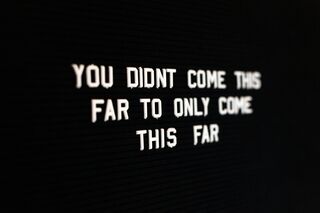ADHD
Is ADHD Sabotaging Your Therapy?
How to get the most out of therapy sessions when you have ADHD.
Posted January 29, 2022 Reviewed by Abigail Fagan
Key points
- For people with ADHD, it can be difficult to get the most out of therapy, but success is possible.
- Inattention, hyperactivity, and impulsivity can be barriers to successful therapy.
- Helpful strategies target attendance, scheduling, attention, movement, communication, and avoidance.
What you give to therapy, is what you get from therapy. For people with ADHD though, it can be extra hard to give therapy your all. In my years doing therapy with adults who have ADHD, many don’t get the most out of it. Inattention, hyperactivity, impulsivity, and ADHD shame can get in the way.
Therapy can change your life (and is recommended for ADHD), but it asks a lot of you too. Honest self-reflection, authenticity, and commitment, to name a few. But let’s take a step back. What is therapy, really? Boiled down, it’s a conversation for nearly an hour, at a regularly scheduled time, with homework. Big yikes for the ADHD crowd! It’s easy to see where things can go awry, before they even start.

Your therapist plays an important role in therapy being helpful for you, but they can’t make the changes for you. They can’t read your mind. They can’t control what you share. They can’t be with you when, or if, you try something new outside of therapy. You are the one that makes therapy work, or not.
ADHD can be a sabotager of rewarding therapy, but it doesn’t have to be. Whether you’re new to therapy, you’ve tried it and didn’t find it helpful, or you’d like your current therapy to be better, follow these tips to keep your ADHD symptoms in check and get more out of your sessions.
1. Go to therapy.
This one might sound simple, but for some people with ADHD, not so much. First and foremost, you’ve gotta show up. You for sure won’t get anything out of therapy if you’re not there. Next level is showing up on time and for every session. When you’re 15 minutes late, you’ve lost one-third of your appointment. If you have ADHD though, showing up isn’t always so straightforward. Appointments can be some of the most challenging and frustrating tasks.
If possible, schedule your appointment while you’re still with your therapist. Put it in your calendar and set reminders for the day and hour before your appointment, or whatever schedule works for you. Write it on a sticky note and put it someplace you see every day. This also helps avoid late cancelation fees, which are all too familiar and enraging to ADHDers.
2. Do therapy at a good time for you.
Try to schedule therapy at a time of day that optimizes your ADHD brain. Therapy requires you to pay attention, stay on task, and be relatively still for almost an hour. Can you follow a conversation better an hour after taking your ADHD medication? Are you less likely to interrupt right after lunch?
Also, minimize your risk of being late and make it easier to be on time. Keep the hour before your appointment open, to avoid frantic rushing. If possible, give yourself the hour after your appointment too. People with ADHD often need time to absorb what was discussed.
3. Find a good fit.
The fit between you and your therapist cannot be understated. Don’t settle for a relationship that you don’t vibe with. You should feel comfortable being your true self, and opening up about your real thoughts, emotions, and experiences.
Find a therapist who’s accommodating to your ADHD needs. If possible, locate an ADHD specialist, especially if you’d like to focus on ADHD or have more complex ADHD symptoms.
4. Fidget in therapy.
If keeping your hands busy helps you to focus, then go for it. The key is choosing a fidget that’s not distracting to you or your therapist (e.g., no spinners). It should help you to listen, remain still, and otherwise engage in therapy.
If fidgets aren’t your thing, but other types of movement are (e.g., chewing gum or sitting on a balance ball), try those too.
5. Tell your therapist about your ADHD symptoms.
Help your therapist help you. Explain your specific ADHD symptoms and what gives you the most trouble. Then, make a plan together to increase the likelihood that therapy is successful, and decrease the likelihood that it's unsuccessful.
If you’re distracted easily, move the chair away from the window, or do teletherapy appointments in a different room. If you get restless, plan 1-minute movement breaks during the session. If remembering appointments is tough, your therapist might be able to set up a reminder system.
6. Tell your therapist what you need from them.
Building off the last tip, tell your therapist what you need from them during therapy, or what helps you most.
For example, if you often go off topic, ask them to redirect you back in conversations. If you need visual representation of time, ask to use a sand timer during appointments. Perhaps you’re best with pre-commitment, and it would help to pay for multiple appointments in advance. Maybe you’d do well with transition signals for the beginning, middle, and end of sessions.
Similarly, let your therapist know if something is unhelpful or not working for your ADHD needs. There’s almost always a way to work it out together. A good therapist wants to help you, in the right way for you.
7. Don’t forget your homework.
What you talk about in therapy is only one part of what helps you. Another huge part takes place after you leave the appointment. This is when you think about what you discovered in session and try new things in your life, often called “homework.” For ADHDers, this can be difficult to remember.
Set reminders during the week to self-reflect, do homework, and consider what you want to discuss in your next appointment. It can be helpful to make things visual, such as putting a reminder note somewhere that you see often, like the refrigerator or bathroom mirror. You can also ask someone in your life to remind you.
Whatever works for you to remember things, do that.
8. Don’t let homework freak you out.
Finally, shame and fear of failure are common to ADHD. Anxiety can spike when receiving a homework assignment. Remember, therapy is not school. You won’t get in trouble or get a bad grade.
If you’re unable to do something that your therapist asked you to do before your next appointment, that’s OK. It’s just data for you both to work with, so that you can learn about yourself and your ADHD symptoms.
Avoidance is a common coping strategy for ADHDers, but resist giving in to it. Show up to your next appointment, tell your therapist what you didn’t do, and talk about what got in your way.
You can and will figure it out together.
To find a therapist who specializes in ADHD, visit the Psychology Today Therapy Directory.
References
Miklósi, M., Máté, O., Somogyi, K., & Szabó, M. (2016). Adult attention deficit hyperactivity disorder symptoms, perceived stress, and well-being: The role of early maladaptive schemata. Journal of Nervous and Mental Disease, 204(5), 364–369. https://doi.org/10.1097/NMD.0000000000000472
Young, Z., Moghaddam, N., & Tickle, A. (2020). The efficacy of Cognitive Behavioral Therapy for adults with ADHD: A systematic review and meta-analysis of randomized controlled trials. Journal of Attention Disorders, 24(6), 875–888. https://doi.org/10.1177/1087054716664413




